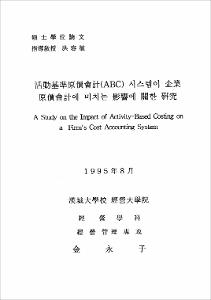活動基準原價會計(ABC) 시스템이 企業 原價會計에 미치는 影響에 關한 硏究
- Files in This Item:
-
-
Download
 000000066272.pdf
기타 데이터 / 2.7 MB / Adobe PDF
000000066272.pdf
기타 데이터 / 2.7 MB / Adobe PDF
-
Items in Repository are protected by copyright, with all rights reserved, unless otherwise indicated.
 000000066272.pdf
기타 데이터 / 2.7 MB / Adobe PDF
000000066272.pdf
기타 데이터 / 2.7 MB / Adobe PDFItems in Repository are protected by copyright, with all rights reserved, unless otherwise indicated.